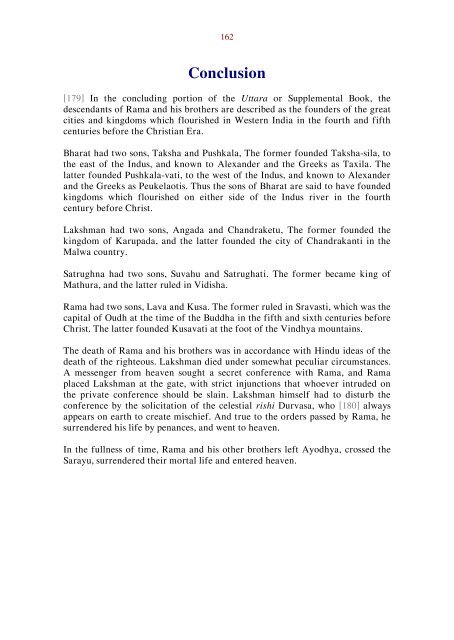Ramayana, Epic of Rama, Prince of India
An Abbreviated Translation of the Indian Classic, the Ramayana by Romesh Chundar Dutt in 2,000 verses
An Abbreviated Translation of the Indian Classic, the Ramayana by Romesh Chundar Dutt in 2,000 verses
Create successful ePaper yourself
Turn your PDF publications into a flip-book with our unique Google optimized e-Paper software.
162<br />
Conclusion<br />
[179] In the concluding portion <strong>of</strong> the Uttara or Supplemental Book, the<br />
descendants <strong>of</strong> <strong>Rama</strong> and his brothers are described as the founders <strong>of</strong> the great<br />
cities and kingdoms which flourished in Western <strong>India</strong> in the fourth and fifth<br />
centuries before the Christian Era.<br />
Bharat had two sons, Taksha and Pushkala, The former founded Taksha-sila, to<br />
the east <strong>of</strong> the Indus, and known to Alexander and the Greeks as Taxila. The<br />
latter founded Pushkala-vati, to the west <strong>of</strong> the Indus, and known to Alexander<br />
and the Greeks as Peukelaotis. Thus the sons <strong>of</strong> Bharat are said to have founded<br />
kingdoms which flourished on either side <strong>of</strong> the Indus river in the fourth<br />
century before Christ.<br />
Lakshman had two sons, Angada and Chandraketu, The former founded the<br />
kingdom <strong>of</strong> Karupada, and the latter founded the city <strong>of</strong> Chandrakanti in the<br />
Malwa country.<br />
Satrughna had two sons, Suvahu and Satrughati. The former became king <strong>of</strong><br />
Mathura, and the latter ruled in Vidisha.<br />
<strong>Rama</strong> had two sons, Lava and Kusa. The former ruled in Sravasti, which was the<br />
capital <strong>of</strong> Oudh at the time <strong>of</strong> the Buddha in the fifth and sixth centuries before<br />
Christ. The latter founded Kusavati at the foot <strong>of</strong> the Vindhya mountains.<br />
The death <strong>of</strong> <strong>Rama</strong> and his brothers was in accordance with Hindu ideas <strong>of</strong> the<br />
death <strong>of</strong> the righteous. Lakshman died under somewhat peculiar circumstances.<br />
A messenger from heaven sought a secret conference with <strong>Rama</strong>, and <strong>Rama</strong><br />
placed Lakshman at the gate, with strict injunctions that whoever intruded on<br />
the private conference should be slain. Lakshman himself had to disturb the<br />
conference by the solicitation <strong>of</strong> the celestial rishi Durvasa, who [180] always<br />
appears on earth to create mischief. And true to the orders passed by <strong>Rama</strong>, he<br />
surrendered his life by penances, and went to heaven.<br />
In the fullness <strong>of</strong> time, <strong>Rama</strong> and his other brothers left Ayodhya, crossed the<br />
Sarayu, surrendered their mortal life and entered heaven.

















